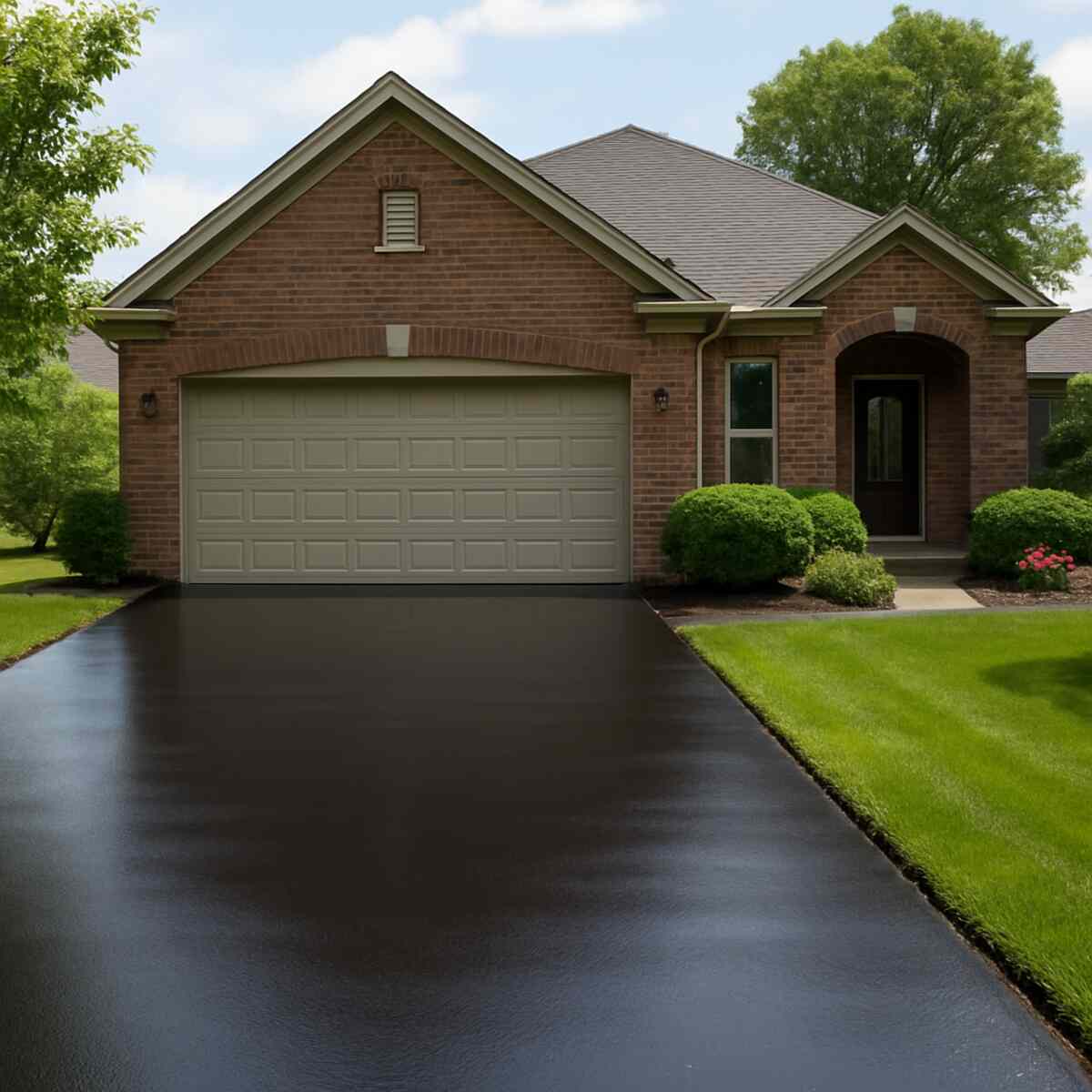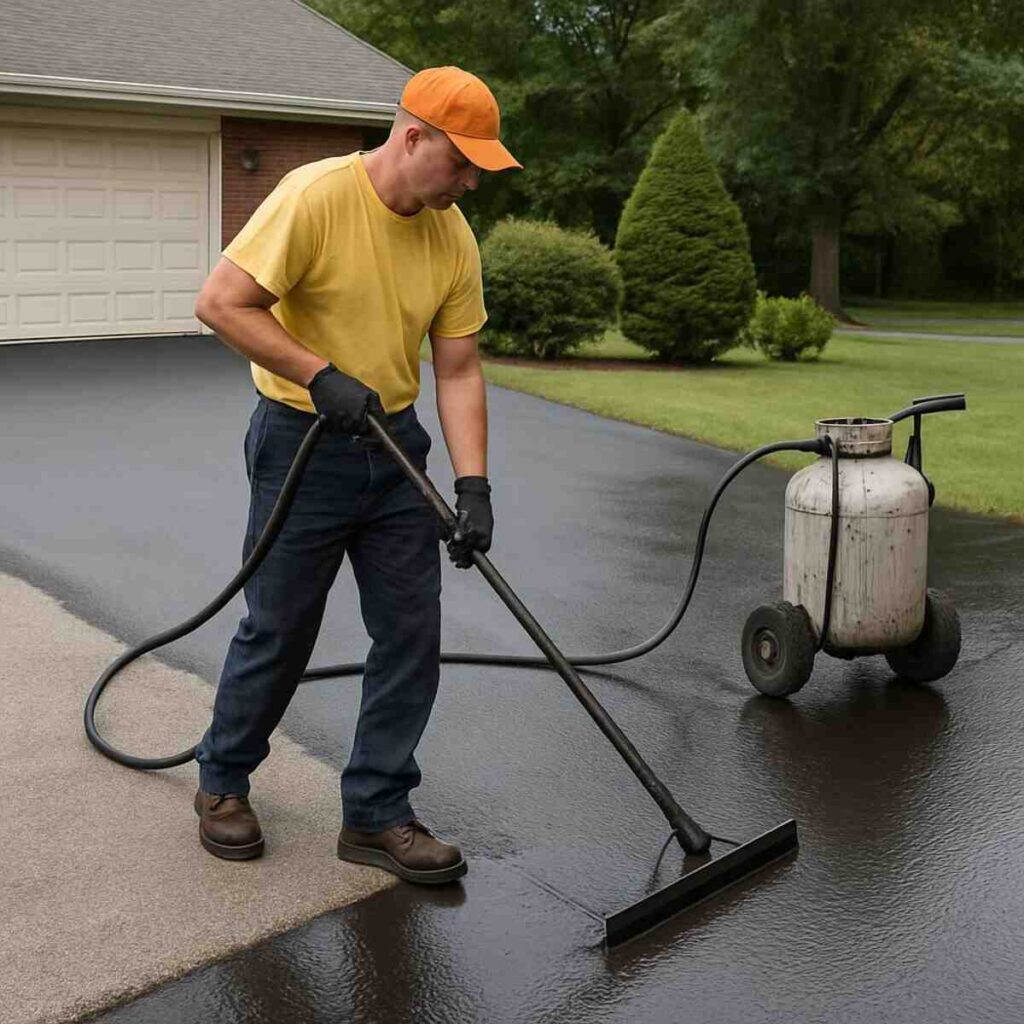How Asphalt Sealcoating Protects Your Driveway

In the simplest terms, asphalt sealcoating is like giving your driveway a protective layer of armor. It’s a liquid mixture applied over your existing asphalt to protect it from the wear and tear of weather, chemicals, and just everyday use. Think of it as sunscreen for your driveway—keeping it safe and looking good! Choose the best franklin asphalt.
Composition of Sealcoat
Sealcoating is typically made of a mixture of bituminous-based products, water, silica sand, polymers, and other proprietary additives. The bitumen provides the binding property, while the sand enhances the texture and skid resistance. The polymers and other additives are included to improve flexibility and durability. This composition is crucial because it determines the sealcoat’s effectiveness in providing a protective barrier against various environmental and mechanical stresses.
Historical Background
Sealcoating has been around since the early 20th century when the need for durable road surfaces became apparent. Initially, roads and driveways were simply packed dirt or gravel, but as vehicles became more prevalent, a more stable surface was needed. Sealcoating emerged as a solution to extend the life of asphalt surfaces, providing protection against the elements and enhancing aesthetic appeal. Over the decades, formulations have improved significantly, making modern sealcoating much more effective and longer-lasting.
Environmental Impact
While the benefits of sealcoating are undeniable, it’s also important to consider its environmental impact. Some sealcoating products contain polycyclic aromatic hydrocarbons (PAHs), which have been scrutinized for their potential environmental and health risks. However, many manufacturers now offer eco-friendly alternatives that significantly reduce or eliminate these harmful compounds. Choosing these greener options not only protects your driveway but also contributes to environmental sustainability.
Why Do You Need It?
Protection Against Elements: Asphalt is tough, but the sun, rain, and snow can really wear it down over time. Sealcoating provides a barrier that keeps the harmful effects of the weather at bay.
Prevents Cracking and Potholes: The protective layer helps prevent water from seeping into your driveway. Water can cause cracks which eventually lead to potholes—nobody wants that!
Enhances Appearance: A freshly sealcoated driveway looks amazing! It gives your home a polished and well-maintained look, which is always a bonus.
Cost-Effective Maintenance: Regular sealcoating can save you money in the long run by extending the life of your driveway and avoiding costly repairs.
The Process of Sealcoating

You might be wondering what goes into sealcoating. Here’s a simple breakdown:
Step 1: Cleaning
Before anything else, the driveway needs to be thoroughly cleaned. Dirt, debris, and any oil stains are removed to ensure the sealant adheres properly.
Removing dirt and debris is critical because any remnants on the surface can prevent the sealcoat from properly bonding to the asphalt. Pressure washing is often used to achieve a deep clean, ensuring all contaminants are eliminated. Oil stains require special attention, often needing degreasers to completely remove the slick residue. A clean surface is vital for the sealcoat to perform effectively and last as long as possible.
Step 2: Repair
Next up, any existing cracks or potholes are filled and smoothed out. It’s like patching up those little nicks before they become big problems!
Cracks are typically filled with a crack filler, which is a rubberized compound that expands and contracts with the asphalt. Potholes may require more extensive repairs, such as cutting out the damaged area and replacing it with fresh asphalt. This step ensures the underlying structure is sound, providing a solid base for the sealcoat. Addressing these issues before sealcoating prevents further deterioration and extends the life of the driveway.
Step 3: Application
Now comes the fun part—applying the sealcoat! The liquid sealant is spread evenly over the surface using a squeegee or sprayer. It’s important to ensure an even coat for maximum protection.
Professionals often use specialized equipment to ensure a consistent application. The squeegee method is great for smaller areas and ensures the sealant is pushed into every nook and cranny. Sprayers, on the other hand, offer quicker application over larger areas. Regardless of the method, ensuring an even and thorough application is key to achieving a durable and long-lasting finish.
Step 4: Drying Time
Last but not least, patience is key. The sealcoat needs time to dry, usually about 24 to 48 hours, depending on the weather. So, plan to park your car elsewhere for a day or two.
Drying time can vary based on humidity, temperature, and airflow. Hot and dry conditions typically speed up the process, while cooler, humid weather can slow it down. During this period, it’s essential to keep the driveway free from traffic, including foot traffic, to avoid damaging the fresh coat. Once fully cured, the sealcoat provides a robust protective layer, ready to take on the elements.
Choosing the Right Sealcoating Service
When it comes to finding the right “asphalt sealcoating Franklin” services, there are a few things to keep in mind:
Experience Matters
Look for companies with a proven track record. Experience means they’ve seen it all and know how to handle any situation that comes up.
Experienced professionals can assess the unique needs of your driveway and recommend the best products and methods. They’re also skilled at troubleshooting any issues that arise during the process, ensuring a high-quality finish. A well-established company is likely to have honed its techniques over the years, providing peace of mind that you’re in good hands.
Quality of Materials
Ask about the type of sealant they use. Quality materials make a big difference in how well and how long the sealcoat will protect your driveway.
High-quality sealants often contain a balanced mix of ingredients that enhance durability and appearance. Inquire about the brand and type of sealant, and consider opting for eco-friendly options when available. A good sealcoating service will be transparent about their materials and eager to explain why they use them. The right sealant can significantly extend the lifespan of your driveway, making it a worthwhile investment.
Customer Reviews
Check out reviews and ask for references. Hearing from past customers can give you a good idea of what to expect.
Online reviews and testimonials are invaluable resources in evaluating a company’s reputation. Look for consistent positive feedback about the quality of work and customer service. Don’t hesitate to ask the company for references or examples of past projects. This firsthand information can provide insight into the reliability and professionalism of the service provider, helping you make an informed decision.
Comparison of Services
It’s wise to obtain multiple quotes from different service providers to compare pricing and services offered. Some companies may include additional services such as crack filling or power washing as part of their package. Others might charge extra for these services. Comparing offerings allows you to assess the overall value and ensures you get the best deal for your needs.
DIY vs. Professional Sealcoating
You might be tempted to tackle sealcoating yourself, and while it’s doable, here’s why you might want to consider hiring a pro:
Time and Effort
Sealcoating is labor-intensive. Professionals have the tools and team to get the job done quickly and efficiently.
DIY sealcoating can be a time-consuming project, especially if you’re unfamiliar with the process. It requires significant preparation and physical labor, which can be overwhelming for one person. Professionals streamline the process with specialized equipment and experienced crews, completing the job in a fraction of the time it would take a DIYer.
Expertise
Pros know how to handle tricky areas and ensure a uniform application, which can be tough for a DIYer.
Achieving a smooth and even sealcoat requires a practiced hand and knowledge of the materials. Professionals are trained to handle any challenges, such as uneven surfaces or intricate edges. Their expertise ensures a high-quality finish that a DIY attempt may struggle to match. Hiring pros can prevent costly mistakes and rework down the road.
Long-Lasting Results
A professional job will generally last longer, saving you money and hassle down the road.
Professionally applied sealcoat tends to be more durable due to the precision and quality of the application. Pros use high-quality materials and apply them in optimal conditions, maximizing the lifespan of the sealcoat. This durability translates to fewer touch-ups and repairs, offering better value over time compared to a DIY approach.
Keeping Your Driveway in Tip-Top Shape
Once you’ve got your driveway freshly sealcoated, you’ll want to keep it looking great. Here are a few tips:
Regular Cleaning
Sweep away debris and wash off any spills promptly.
Keeping your driveway clean not only enhances its appearance but also prevents substances from breaking down the sealcoat. Regular sweeping removes abrasive materials that can scratch the surface, while prompt washing of spills prevents staining and chemical damage. Maintaining cleanliness is a simple yet effective way to prolong the life of your sealcoat.
Watch for Cracks
Address any small cracks quickly to prevent them from expanding.
Even with sealcoating, cracks can occasionally appear, especially in high-stress areas. Regularly inspect your driveway and address any minor cracks before they worsen. Quick repairs prevent moisture infiltration, which can lead to more significant damage. Early intervention saves time and money in the long run, preserving the integrity of your driveway.
Avoid Heavy Loads
Try not to park heavy vehicles on your driveway for extended periods.
Heavy vehicles can exert significant pressure on your driveway, potentially leading to depressions or damage. If possible, avoid parking oversized vehicles or equipment on the surface for prolonged periods. Distribute weight evenly when necessary, using boards or similar materials to minimize stress on the asphalt. Being mindful of weight can significantly extend the lifespan of your driveway.
Seasonal Care
Adapt your maintenance routine to the seasons. In winter, clear snow and ice promptly to prevent freeze-thaw damage. In the summer, ensure your driveway is shaded where possible to protect against UV damage. Each season presents unique challenges, and tailoring your care routine accordingly will help maintain your driveway’s pristine condition year-round.
Wrap Up
So there you have it—everything you need to know about how asphalt sealcoating can protect and prolong the life of your driveway. Whether you’re a homeowner, a content marketer looking to simplify information, or a student breaking down complex ideas, understanding the benefits and process of sealcoating can be incredibly useful. Remember, a little maintenance now can save you a whole lot of trouble later on. Happy sealcoating!